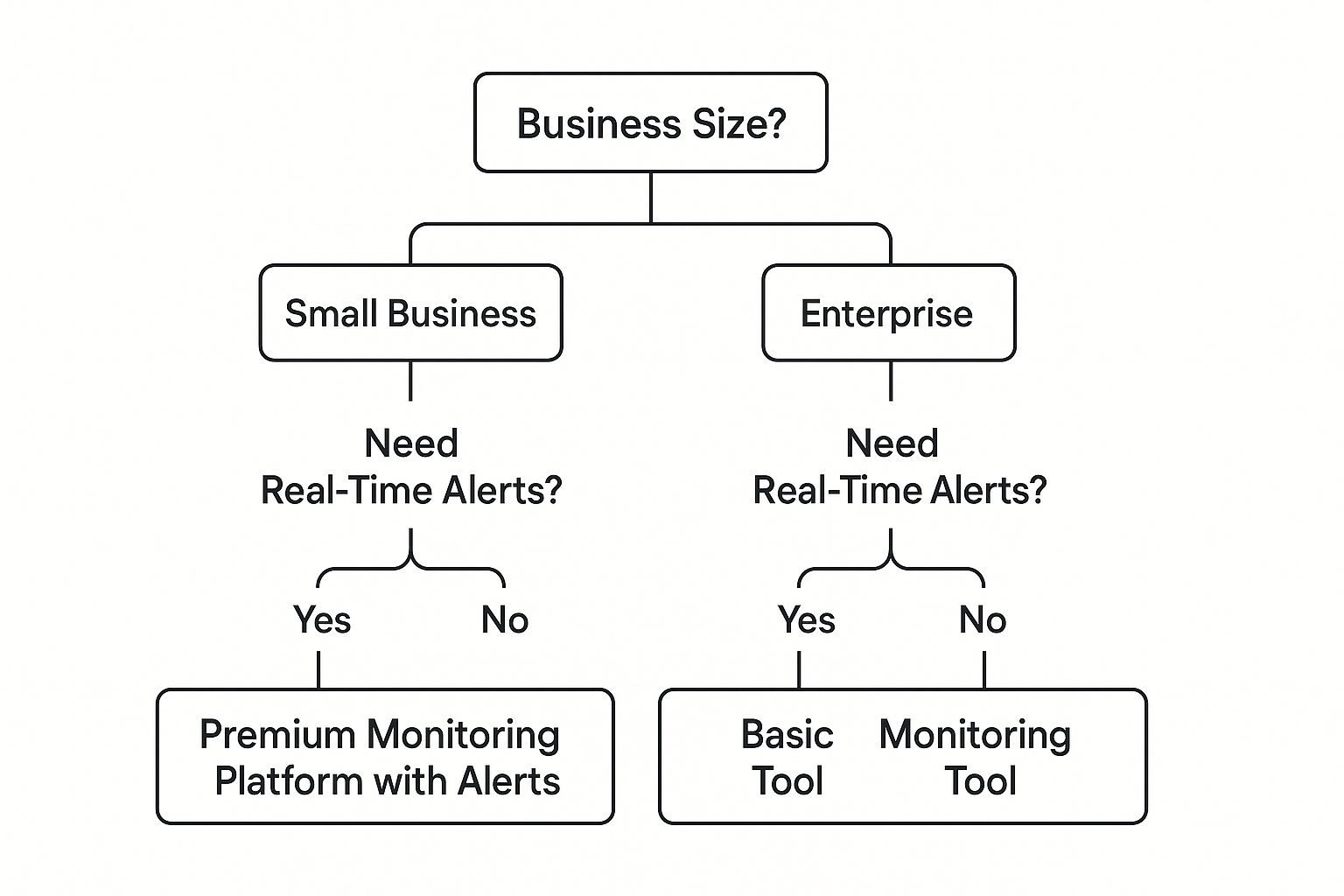Why Your Digital Reputation Matters More Than Ever
Imagine your online reputation as the storefront of your business in the digital world. In the fast-paced AE region, this "storefront" is always under scrutiny. Every online interaction, from a quick social media comment to a detailed product review, shapes how potential customers see your brand. This digital story can either boost your business or hold it back.
For example, one bad review can quickly turn into a PR nightmare if not addressed, hurting not just sales but also your ability to attract good employees and secure important partnerships.
This constant flow of information is a big change from traditional PR. Companies used to control their story through carefully written press releases. Now, anyone with an internet connection can contribute to the story – instantly. This is why proactive online reputation management services are essential, not a luxury. Customer opinions are formed in seconds based on search results, and these opinions have a huge impact on whether or not someone buys your product or service.
The Impact of Online Reviews
Online reviews are especially important in the AE region, where consumers are tech-savvy and rely heavily on online information to make choices. Think about it: before trying a new restaurant or booking a hotel, what's the first thing you do? You probably check reviews online. This reliance on digital word-of-mouth shows how crucial online reputation management services are for shaping customer perception and driving business success.
The unique culture of the AE region adds another layer. Trust and personal recommendations carry significant weight. This makes it even more important for businesses to build a positive online image. The Middle East and North Africa (MENA) region especially emphasizes online presence and digital reputation, as highlighted in the 2025 MENA Barometer by Partoo. This report reveals important trends and insights on how companies in the region manage their online reputation, emphasizing the importance of digital visibility. Learn more here.
The key takeaway from this image is the high number of companies prioritizing their online presence. This reinforces the idea that managing your digital reputation isn't just a fad – it's a core business function, crucial for succeeding in the modern AE market.
The Price of Neglect
Ignoring your online reputation can have real consequences. Negative search results can directly impact your profits, leading to lost sales and weaker brand loyalty. A damaged reputation can also make it harder to attract and keep talented employees, secure funding, and build strong business relationships.
Think of it like dominoes: one negative piece of online content can set off a chain reaction, destroying trust and blocking growth. Therefore, actively managing your online reputation is an investment in the future of your business. This involves not just responding to negative feedback but also actively building a positive online presence that highlights your brand's strengths and values. This protects your business and opens doors for growth and future success.
What Makes Reputation Management Services Actually Work
Think of professional online reputation management (ORM) services as your brand's dedicated PR team, working tirelessly behind the scenes to shape public perception online. What sets them apart from DIY efforts? It’s the specialized toolkit and expertise they bring to the table. We're not just talking about deleting negative comments here; this is about a proactive, holistic approach to building a positive online presence.
Key Components of Effective Online Reputation Management
One crucial element is sentiment analysis, often powered by AI. Imagine it like having a highly perceptive friend who can read between the lines. This technology doesn't just label comments as positive or negative; it digs into the nuances of language, deciphering the emotions and intent behind online conversations. This helps you understand the "why" behind customer feedback, revealing hidden frustrations that might lurk beneath seemingly neutral comments.
Advanced monitoring systems are another vital piece of the puzzle. These systems act as your brand's digital eyes and ears, constantly scanning a multitude of platforms—social media, review sites like Yelp, forums, news articles, you name it. This gives you a real-time snapshot of how your brand is perceived across the web. Predictive analytics add another layer of protection, acting like a crystal ball that helps anticipate potential reputation threats before they blow up. By identifying patterns and trends, these tools can flag potential crises, giving you time to intervene proactively and minimize damage.
To grasp the importance of digital reputation, let's consider the hospitality industry. Hotel reputation management is crucial for attracting guests, and even a single negative review can significantly impact bookings.

This screenshot from Wikipedia’s Online Reputation Management page shows just how multifaceted ORM can be. It highlights key areas like monitoring, suppression of negative content, and the generation of positive content, all working in concert to shape the online narrative around a brand.
Before we dive deeper into building a positive presence, let's look at the core components of ORM services and their impact. This table provides a clear comparison:
Essential ORM Service Components Comparison
A detailed comparison of core reputation management service features and their business impact
| Service Component | Primary Function | Business Impact | Technology Used |
|---|---|---|---|
| Sentiment Analysis | Analyzes online conversations to understand customer emotions and intent. | Provides insights into customer feedback, reveals hidden issues, informs customer service strategies. | Natural Language Processing (NLP), AI, Machine Learning |
| Brand Monitoring | Tracks brand mentions and conversations across various online platforms. | Provides real-time awareness of brand perception, helps identify potential threats and opportunities. | Web scraping, social listening tools, data analytics |
| Predictive Analytics | Identifies patterns and trends to anticipate potential reputation crises. | Enables proactive intervention and damage control, minimizes negative impact on brand image. | Machine Learning, statistical modeling, trend analysis |
| Content Creation & Promotion | Develops and distributes positive content to enhance brand image and control the narrative. | Builds a strong online presence, improves search engine rankings, attracts positive media coverage. | Content Management Systems (CMS), SEO tools, social media marketing platforms |
| Review Management | Solicits, monitors, and responds to online reviews. | Improves online ratings and reviews, strengthens customer relationships, addresses customer concerns. | Review management platforms, customer feedback tools |
This table clearly illustrates how each component plays a vital role in shaping and protecting your brand's reputation online. From understanding customer sentiment to proactively addressing potential crises, these services offer a comprehensive approach to online reputation management.
Building a Positive Online Presence
Effective ORM services don't just put out fires; they actively build positive momentum. This means creating engaging content that showcases your brand's strengths, interacting with your audience on social media, and encouraging positive reviews. It’s like building a solid foundation for your brand's online presence, making it resistant to negative attacks.
This proactive approach involves a multi-pronged strategy:
- Content creation: Think high-quality blog posts, articles, and social media updates that position your brand as an expert and build trust.
- Review management: Actively seek out and respond to customer reviews, addressing any concerns promptly and professionally.
- Social media engagement: Create a vibrant social media presence by interacting with your audience, sharing valuable content, and responding to comments and messages.
Successful reputation management takes ongoing effort. It's not a one-time fix but a continuous process of monitoring, analyzing, and adapting. You might be interested in: Check out our guide on how to market your business growth strategies. The ultimate goal is to cultivate a positive online image that attracts customers, builds trust, and strengthens your brand. This proactive approach is a key difference between professional services and amateur attempts. By focusing on long-term brand building, professional ORM creates a sustainable platform for online success.
The Hidden Cost Of Ignoring Your Online Reputation

This image shows the projected growth of the global online reputation management services market. The upward trend really highlights how important a good online image is becoming for businesses. And it makes sense when you think about the financial hit a damaged reputation can cause.
Think of your online reputation like your shop window in the AE region. A messy, uninviting shop front will keep customers away, and a negative online presence does the same thing. This lost business means lost revenue.
Imagine someone in Dubai searching for a "luxury hotel." They find bad reviews about terrible service or dirty rooms. What do you think they'll do? Probably book with a competitor who looks better online.
But it doesn't stop with lost sales. Bad reviews affect more than just customers; they influence hiring and partnerships, too. Talented people don't want to work for a company with a questionable reputation. Partners might think twice about working with you. And it can hurt your own professional brand, especially in the closely connected AE business world. Want to know more about boosting your local presence? Learn more in our article about improving local SEO.
Ignoring online reputation management is like letting a small problem become a big one. Negative feedback can snowball. Dealing with negative comments quickly stops this from happening, and building a positive online presence makes your brand stronger. That's why online reputation management services are so important.
There's also a big opportunity cost to ignoring your online reputation. If you're not actively building a positive online presence, you're missing out on potential customers, partnerships, and growth. This cost is hard to measure, but think about the extra sales from good reviews or landing a big partnership.
While data specifically for the AE region is limited, the global market tells a story. The global market size was in the billions, and it's projected to keep growing. This shows a big increase in demand for these services. Find out more here. Investing in online reputation management isn't just a cost; it's an investment in your business's future. This proactive approach protects your profits and sets your brand up for long-term success in the competitive AE market.
How To Choose A Service Provider That Delivers Results
Finding the right online reputation management (ORM) service can feel like searching for a needle in a haystack. So many promises, so many packages – how do you cut through the noise? This section will help you separate the wheat from the chaff and find a provider that genuinely helps your business. We’ll uncover the warning signs of less experienced providers, like those who guarantee specific timelines or offer generic solutions. These approaches often miss the specific details that make your situation unique.
Asking the Right Questions
Choosing the right ORM service begins with a good conversation. Instead of being dazzled by slick presentations, dig deep into how the provider actually works. Here are some essential questions to ask:
- What is your specific strategy for my situation? A reputable provider will create a custom approach, not a one-size-fits-all plan.
- How will you measure success? Don't be fooled by surface-level metrics like follower counts. Focus on real results, such as improved search engine rankings and more positive customer reviews.
- Do you have case studies from businesses like mine? Seeing how a provider has helped similar companies gives you a realistic view of what they can do.
- How will we communicate? Clear, consistent communication is vital. You need a provider who keeps you in the loop and promptly addresses any concerns.
- How does your pricing work, and what's included? Transparency is key. Make sure you understand exactly what you're paying for and which services are covered.
Before diving deeper into pricing and other factors, let's look at how different tools fit different needs.

This infographic helps visualize how to choose ORM tools. Think of it as a decision tree. Smaller businesses that don’t need instant alerts might be fine with basic monitoring. Larger businesses, however, may need a premium platform with real-time alerts to address issues quickly.
Decoding Pricing Models
ORM services typically use a few different pricing models. Understanding these will help you evaluate whether you're getting your money’s worth.
- Performance-based pricing: You pay based on the results the provider achieves, like boosting your search rankings or increasing positive reviews.
- Project-based pricing: You pay a fixed price for a specific project, such as managing a reputation crisis or launching a brand-building campaign.
- Retainer-based pricing: You pay a regular monthly fee for ongoing services, including reputation monitoring, content creation, and review management.
Each model has trade-offs. Performance-based pricing can be motivating for the provider, but it can make budgeting tricky. Project-based pricing is good for one-time projects but may not cover your ongoing reputation needs. Retainer-based pricing offers predictable costs but requires a close look at the services included.
To help you weigh these factors along with others when choosing a provider, let's look at a comparison framework. The following table, "ORM Service Provider Evaluation Matrix," offers a structured way to compare and evaluate different reputation management services.
| Evaluation Criteria | What to Look For | Red Flags | Weight in Decision |
|---|---|---|---|
| Customized Strategy | A tailored approach designed for your specific needs and goals. | Generic, one-size-fits-all solutions. | High |
| Measurement of Success | Focus on tangible outcomes like improved search results, increased positive reviews, and engagement. | Reliance on vanity metrics like follower count without connection to business impact. | High |
| Relevant Case Studies | Demonstrated success in your industry or with similar businesses facing similar challenges. | Lack of relevant case studies or vague examples. | Medium |
| Communication Process | Clear, regular communication updates, responsiveness to inquiries, and proactive problem-solving. | Infrequent or unclear communication, slow response times. | Medium |
| Pricing Transparency & Value | Clear explanation of pricing structure, services included, and value proposition. | Hidden fees, unclear contract terms, lack of clarity on deliverables. | High |
| Realistic Promises | Honest assessment of timelines and achievable results, acknowledgment that reputation management is an ongoing process. | Guaranteed rankings or overnight results, unrealistic promises of quick fixes. | High |
This matrix highlights some of the most critical elements to consider. A customized strategy and clear communication are important, but be wary of providers making unrealistic promises. A focus on tangible results and transparent pricing should weigh heavily in your decision.
This screenshot shows the projected growth of the enterprise internet reputation management market in the GCC region. It’s expected to grow at a CAGR of 17.1% from 2025 to 2035, from USD 67.0 million in 2025 to USD 323.6 million by 2035. You can learn more about this growth in the GCC market here. This reinforces the growing importance of investing in professional ORM.
Realistic Expectations and Red Flags
Managing your online reputation is a marathon, not a sprint. It takes time and consistent effort to see real improvement. Don't trust providers promising instant miracles or guaranteed search rankings. These are often signs of inflated claims. Another red flag is a lack of transparency. If a provider avoids explaining their methods or showing examples of their work, be cautious. A true reputation management partner will openly discuss their strategies and show you proof of their success. Choosing the right provider is an investment in your brand. Ask the right questions, understand pricing, and watch out for warning signs. This will help you make a smart choice that supports your goals and sets you up for lasting success.
Success Stories That Show What's Actually Possible
Real-world examples are the best way to understand the impact of online reputation management (ORM) services. Let's dive into some compelling success stories, showing how ORM can transform challenges into opportunities for businesses in the AE region and beyond. These cases illustrate how a smart reputation strategy can boost everything from customer trust to your bottom line.
From Crisis to Opportunity: A Restaurant's Comeback Story
Picture a popular Dubai restaurant suddenly hit by a crisis: a viral social media post claiming food poisoning. Negative reviews start pouring in, and reservations plummet. This nightmare scenario is, unfortunately, a reality for many businesses. But with the help of a skilled ORM service, this restaurant not only survived, it thrived.
The ORM service took a multi-pronged approach. They started by carefully monitoring online mentions, responding to negative reviews with empathy and professionalism. They were transparent about the situation, explaining the steps taken to fix the problem, including improved hygiene practices and staff retraining. At the same time, they encouraged happy customers to share their positive dining experiences. Gradually, the conversation changed. The negative buzz died down, replaced by positive feedback about the restaurant's great service and delicious food.

This screenshot from Wikipedia's crisis management page highlights the essential steps in navigating a crisis. The focus on preparedness, communication, and recovery mirrors the restaurant's strategy, demonstrating the importance of a structured approach. By addressing the issue, taking corrective action, and communicating honestly, the restaurant didn't just handle the crisis, it strengthened its reputation for customer care.
This story shows how ORM services can turn a potential disaster into a PR success, building resilience and customer loyalty. The restaurant recovered and came out stronger, with a renewed dedication to customer satisfaction.
Building a Brand from Scratch: A Tech Startup's Journey
Imagine a tech startup in Abu Dhabi launching a new app. They needed to build brand awareness and trust in a competitive market. Their strategy? Proactive online reputation building. An ORM service helped them craft a compelling brand narrative, showcasing the app's unique features through engaging content. They became active in online communities, connecting with potential users and influencers.
They also focused on gathering positive reviews and testimonials, proving the app’s value. If you're looking for an ORM service, check out postline.ai. This consistent work built a strong online presence, positive brand perception, and increased user adoption. Thanks to their positive online reputation, the startup secured valuable partnerships and attracted investors.
Key Takeaways from Success Stories
These stories highlight some vital lessons:
-
Proactive Management is Key: Responding to negative feedback is crucial, but proactively building a positive online image is even more important.
-
Transparency Builds Trust: Open communication, particularly during a crisis, builds stronger customer relationships.
-
Targeted Strategies Yield Results: A tailored strategy that aligns with your specific business needs and goals is essential.
-
ORM is an Investment: While there are costs involved, a strong online reputation offers long-term benefits that far outweigh the initial investment.
These real-world examples demonstrate the tangible business benefits of ORM. By understanding these successes, businesses in the AE region and beyond can harness the potential of strategic reputation management and use it to achieve sustainable growth. A strong online reputation isn't just about appearances; it's about building trust, attracting customers, and driving business success.
Making Your Investment Pay Off Long-Term
Effective online reputation management isn't a sprint; it's a marathon. It's not about putting out fires, but building a system that strengthens your brand over time. Think of it like a well-oiled machine: all the parts working together smoothly to produce a powerful outcome. This section explores the core strategies that differentiate businesses with resilient reputations from those constantly playing defense.
Building a Sustainable Reputation Management System
A truly robust reputation management system isn't just about external actions; it's about internal alignment. Imagine your company as a ship: every department needs to be rowing in the same direction to reach its destination. This means bringing your customer service, marketing, and communication teams together with a shared understanding of your reputation goals.
Give your customer service representatives the power to handle negative feedback quickly and effectively. Sometimes, a dissatisfied customer can become your biggest advocate with the right care. Also, make sure your marketing accurately reflects your brand's values, avoiding mismatches that can trigger negative reviews.
Set up clear communication channels to track and respond to online mentions. Think shared dashboards or regular reports that keep everyone informed. This integrated approach helps ensure your reputation efforts are supported by the entire organization, multiplying their effect. Learn more in our article about marketing campaign tracking. This internal harmony is key for long-term wins, creating a cohesive brand experience at every customer touchpoint.
Balancing Monitoring and Proactive Reputation Building
Effective online reputation management is like a seesaw: it requires a balance between monitoring and actively shaping your online narrative. Monitoring is like having your ear to the ground, listening to what people are saying. It helps you catch negative feedback and address it quickly.
But just reacting isn’t enough. You need to be proactive, building a positive presence. Think creating engaging content that highlights your strengths, interacting with your audience on social media, and encouraging positive reviews.
This screenshot from Wikipedia's Brand Management page shows the interconnectedness of elements that shape brand perception. Reputation management isn't isolated; it's deeply linked to your broader brand strategy. Building a strong brand image requires a holistic approach that encompasses all these facets. This proactive approach builds a strong foundation for your brand, making it resistant to negativity.
Measuring Success Beyond Vanity Metrics
While metrics like followers and website traffic can be helpful, real success in reputation management goes deeper. Instead of focusing on vanity metrics, focus on indicators that truly show the impact of your work. Things like better star ratings on review sites, fewer negative search results, and more positive customer sentiment online.
These metrics give you a more accurate view of how your reputation is influencing customer perception and your bottom line. For example, track how many visitors who interact with positive reviews end up becoming customers. This data-driven approach helps you fine-tune your strategies, maximizing the return on your reputation investment.
Emerging Trends and Technologies
The world of online reputation management is always changing, with new technologies and trends popping up regularly. Artificial intelligence (AI) is becoming increasingly important, offering more advanced sentiment analysis and predictive powers. AI tools can sift through huge amounts of data to identify potential reputation risks before they blow up, allowing for proactive intervention.
Blockchain technology is also being explored to increase transparency and trust in online reviews. Blockchain-based systems can help verify the authenticity of reviews, making them more reliable for both customers and businesses. Staying on top of these trends helps you adapt and maximize your reputation management efforts, ensuring you’re prepared for whatever comes next.
Your Next Steps To Reputation Success
Now that you understand the value of online reputation management (ORM) services, let's talk about creating a plan that works for you. Whether you're putting out fires or building a solid reputation from the ground up, the steps you take now are crucial.
Assessing Your Current Reputation
First things first, you need to know where you stand. It's like a checkup for your brand. Start by Googling yourself. What pops up? Anything good? Does it reflect your brand’s values? Check review sites like Yelp, social media like Facebook and Twitter, and forums to see what people are saying about you. This gives you a baseline to measure your progress.
For example, if negative reviews are all over the place, your top priority is damage control. If you barely have an online presence, you'll need to build a positive image through content and engagement.
Setting Realistic Goals and Timelines
Reputation management is a marathon, not a sprint. You need realistic goals and expectations. Set clear, measurable goals. Maybe you want to boost your star rating on Yelp by 10% in three months. Or perhaps increase positive brand mentions on Twitter by 25%.
This screenshot from Wikipedia's Strategic Planning page shows how planning, execution, and evaluation work in a cycle. Just like reputation management, it's an ongoing process of monitoring, adjusting, and improving. This flexible approach lets you adapt and refine your strategy for better results in the long run. Speaking of accessibility, a simple way to connect your online presence to offline materials is by using effective QR codes.
A realistic timeline is equally important. Building a strong online reputation doesn't happen overnight. Consistency is key.
Building Long-Term Reputation Resilience
Think of reputation resilience as a strong immune system for your brand. It helps you handle negative feedback and recover from crises. One strategy is creating a lot of positive content.
Think helpful blog posts, engaging social media updates, and positive customer reviews. This builds a defense against negativity. Building a community is important, too. Engage with your audience and build strong relationships. These folks can become your brand advocates, defending you against online attacks.
Addressing Implementation Challenges
Putting a reputation management plan into action can be tricky. One challenge is getting everyone on board, from customer service to marketing. Make sure everyone understands the importance of your online reputation.
Another challenge is measuring the return on investment (ROI). Focus on metrics tied to business outcomes, like increased sales or better customer retention. This data-driven approach shows the value of your work.
Creating a 90-Day Action Plan
To help you get started, here’s a practical timeline:
To help you get started, here’s a practical timeline you can use:
90-Day ORM Implementation Timeline
A practical month-by-month action plan for implementing online reputation management strategies
| Phase | Key Activities | Expected Outcomes | Success Metrics |
|---|---|---|---|
| Month 1: Assessment and Strategy | Audit your online presence. Identify reputation goals and target audiences. Develop a tailored ORM strategy. | Understand your current reputation. Define goals and target audiences. Create a documented ORM strategy. | Baseline reputation score. Number of negative reviews. Social media sentiment. |
| Month 2: Implementation and Monitoring | Start putting your strategy to work. Set up monitoring tools and respond to mentions. Create and share positive content. | Improve online visibility. Increase positive mentions. Boost customer engagement. | Number of positive reviews. Social media engagement. Website traffic from positive mentions. |
| Month 3: Analysis and Refinement | Analyze results from the first two months. Refine the strategy based on data and feedback. Find areas for improvement and adjust the plan. | Gain insights into strategy effectiveness. Create a refined action plan. Increase reputation resilience. | Change in reputation score. Percentage reduction in negative reviews. Improvement in customer sentiment. |
This timeline gives you a roadmap to reach your reputation goals. By focusing on assessment, implementation, and ongoing improvements, you can turn your online reputation into a powerful asset.
Ready to take control of your online story and unlock the benefits of a positive reputation? Contact Technogital F.Z.C. today at https://www.technogital.ae and let us help you build a brand reputation that truly shines.

